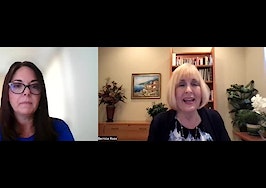 Readers who prioritize second homes and investment properties turn to Inman’s weekly Property Portfolio email newsletter, whether they’re agents who work with this special class of clients or investors themselves. This month, we’ll go deeper on everything from the latest at Airbnb and Vrbo to the changes investors are making to their portfolios in a shifting real estate market.
Readers who prioritize second homes and investment properties turn to Inman’s weekly Property Portfolio email newsletter, whether they’re agents who work with this special class of clients or investors themselves. This month, we’ll go deeper on everything from the latest at Airbnb and Vrbo to the changes investors are making to their portfolios in a shifting real estate market.
According to Housing.com, 95 percent of the time, women are the key decision-makers when it comes to buying a home or renting an apartment. As the baby boomer men die off during the next five to eight years, women will control an astounding $32 trillion of the country’s wealth. Sadly, many women are totally unprepared to handle what’s ahead.
I recently interviewed Dr. Patricia Ross, the founder of Girl Power Finance. Her homepage explains how we get ourselves into debt and the costs of doing so:
No one ever thinks, “Oh, I want to be in debt.”
We do say to ourselves, “I have to have those shoes…” We whip out our credit card and the next thing we know, we’ve paid three times what they’re worth — and the card still isn’t paid off.
What is ‘financial menopause’?
Ross goes on to explain on her website,
Debt is like a bad ex. It doesn’t go away no matter how much you pay, or reason with it, and pay some more.
It’s the silent killer of dreams.
It gives you the worst kind of budgetary hot flashes.
That leads to Financial Menopause.
“Financial menopause” is the fear of not having enough money, especially as you approach retirement.
‘Don’t pat me on the head and tell me I don’t need to worry about it’
According to Ross, the primary challenge women face today is that the options for managing their money are so shortsighted and unpredictable that many of us don’t know what to do or where to turn. Even though women will have this monetary clout, few know how to wield it effectively.
Ross describes her experience and what led her to start Girl Power Finance.
I’m an English professor by training. I started in this business (Girl Power Finance) by writing books on finance, money management, and retirement. I had the big guys basically pat me on the head and say, “Don’t worry your pretty little head about modern portfolio theory or how money works.”
So, getting patted on the head really drove me a little nuts. Nobody gets to do that. Nobody likes being patted on the head, marginalized, and put in a corner, and being told, “You don’t need to know this because you’re not smart enough, you’re not good enough, you don’t have enough, whatever, to be able to handle this kind of knowledge. [And that’s why] women are saying, “You’re fired, baby!”
To support her point, Ross shared a rather stunning statistic:
Once women lose their spouses, 70 percent of them fire their former financial advisers.
The dirty little secret financial advisers and stock traders don’t want you to know
According to Ross, when women (or men) really become educated about how the fees in their stock portfolios or 401Ks work, they would never agree to these terms. When these people play the stock market on your behalf, they make money even if you are experiencing massive losses. They don’t want you to understand that they put your money at risk to make steady income for themselves by doing trades on your behalf.
Moreover:
The stock market is a gamble because it goes up and it goes down. Everyone loves it when it’s going up because we are making money. [When the market is going down] we become fearful because of how suddenly you can lose 20 percent or more of your entire investment. On a million dollars, that’s $200,000. That’s a lot of cash.
If you’re in the stock market, you’re gambling. It’s like going to the tables in Las Vegas and saying, “I’m going to win a lot or I’m going to lose a lot.”
The games of risk and safety
Ross recommends that her clients take a balanced approach to money management that includes a portfolio with some degree of risk. The choice really comes down to how much safety you want vs. how much risk you’re willing to tolerate. The less risk you are willing to tolerate, the more conservative your investment strategies should be.
Overcoming financial menopause
Ross shared a story about one of her clients who is a very successful businesswoman with a massive real estate portfolio. Despite her substantial wealth, she was still worried about having enough money for retirement.
Ross describes the symptoms of “budgetary hot flashes,” “monetary mood swings” and “nightmarish night sweats” of financial uncertainty, as symptoms of financial menopause.
This is exactly what her client was experiencing. When her client said she was 70 years old and was worried about having enough money for retirement and not needing to worry about it anymore, Ross replied:
Sister, that’s financial menopause. When we start worrying about if we’re going to have enough or not, we go down this path, and it’s not a good path, that gives us wrinkles.
When I discuss this, everyone laughs, but it’s because it’s true. It’s like we have enough gray hair and wrinkles, we don’t want to see our bank accounts get shriveled up as well.
The starting point
Ross recommends that you start by focusing on your talents, your current portfolio, and your financial goals. Begin your investment journey by working with what you know, like and trust. Assess your degree of risk and adjust your investment strategies appropriately.
Your ultimate goal is for your passive income stream to become your primary source of income as quickly as possible.
Her final piece of advice is:
We are the money masters of the universe, but we just don’t know it yet. No matter where you are in your financial journey, take what you know and build on that. Knowledge is power, so get educated. Evaluate the pluses and minuses. That’s what makes us powerful. That’s what gives us strength and keeps us out of financial menopause.
Bernice Ross, president and CEO of BrokerageUP and RealEstateCoach.com, is a national speaker, author and trainer with more than 1,000 published articles. Learn about her broker/manager training programs designed for women, by women, at BrokerageUp.com and her new agent sales training at RealEstateCoach.com/newagent.













